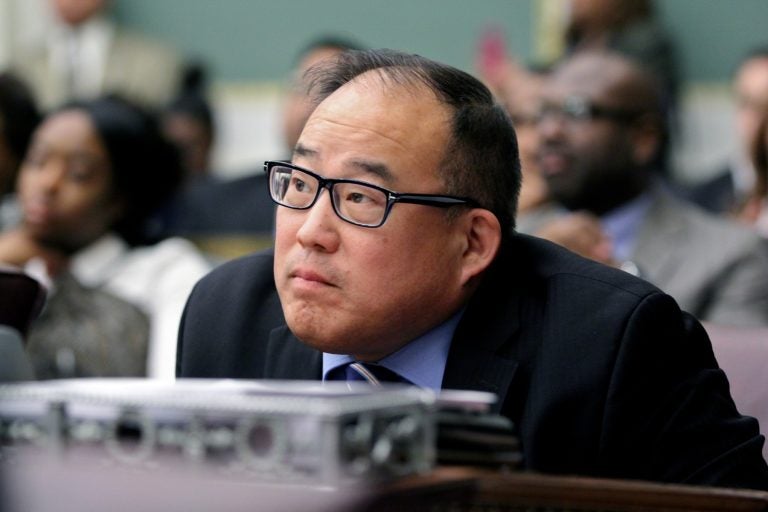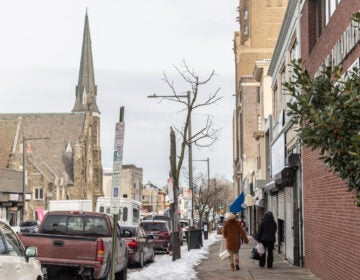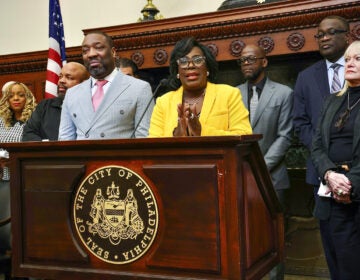Changes to controversial anti-squatting law advance in City Council
Cherelle Parker and David Oh repeatedly clashed about a new law authored by Oh making it easier for landlords to kick out people they believe are squatting in their property.

City Councilman David Oh. (Emma Lee/WHYY)
This story originally appeared on PlanPhilly.
—
In an unusual display of public animosity, Philadelphia City Council members Cherelle Parker and David Oh repeatedly clashed Tuesday about a new law authored by Oh making it easier for landlords to kick out people they believe are squatting in their property. The sparring ended in Parker’s favor with amending legislation authored by the councilwoman moving forward.
Oh’s contested anti-squatting measure, which went into effect in September, sought to clarify police procedures for dealing with squatters and gave property owners a means to get alleged squatters before a judge within five days of reporting the problem. Council passed it in an unusually tight 11-to-6 vote. Mayor Kenney did not sign Oh’s bill, saying in a letter to the council that it would create “ambiguities” in enforcement and would not fulfill Oh’s intent. But the mayor also did not veto it, allowing to become law by default.
The bills under discussion at a Committee on Public Safety hearing on Tuesday would amend that legislation in response to feedback Parker’s office received from law enforcement and legal aid groups. One piece of legislation would create a new law designed to protect renters against fraudulent leases that trick tenants into becoming squatters by accident. The other would amend Oh’s controversial law. Both bills got the support of the committee and will be heard by the full Council.
Since Parker introduced her legislation, Oh’s office and landlords groups have been attacking it on social media, saying it endangers property owners rights and encouraging constituents to call their councilmembers in opposition.
“For those watching at home, who might feel I’m a tad bit passionate right now, if you knew the hell I went through,” shouted Parker, at the heated conclusion of her opening remarks. “The diplomatic silence I’ve maintained [while] social media is used as a way to bully my Council colleagues…Well, I’m not going to let anybody bully me. The facts matter.”
Critics of Oh’s original legislation say it was unnecessary, given that as early as the spring of 2018 the police were already circulating potential policy changes. They also say that the bill is redundant and confusing because there are already many laws on the books that make squatting illegal.
Despite the fact that his legislation spurred change within the city’s law enforcement institutions, Oh insisted on Tuesday that the bills introduced by Parker represented an attempt to coddle criminal elements at the expense of property owners.
“Under this bill, rights and protections for homeowners are being stripped away,” said Oh. “Most of the people we’ve heard from are senior citizens; they are poor, they don’t have another house to go to.”
In response, Parker framed her work as correctives to Oh’s legislation, which she said didn’t “make a damn bit of sense.” Parker’s legislation seeks to clearly define “criminal and defiant trespassers,” by clarifying that there are categories of occupants who should not be considered squatters even if they don’t have clear legal rights. There are complicated dynamics of rental markets and property ownership, especially in the city’s low-income neighborhoods that Oh’s bill did not cover, including tangled title cases, renters who agree to oral leases, and those who are tricked into renting from people who don’t actually own buildings. Parker’s bill would give those who have become squatters by accident 15 days to move out. That provision was specifically denounced by Oh.
The Councilwoman’s bill also strips some of the language in Oh’s legislation that critics said caused confusion. Among the bits on the cutting floor are a provision that would require a 90-day jail sentence for anyone convicted of squatting. State law already punishes squatters, critics said, making the mandatory sentence redundant and confusing. Parker’s bill also includes protections for domestic violence victims and other vulnerable categories of tenants who she fears could have had the broad definitions in Oh’s bill weaponized against them.
Parker repeatedly noted on Tuesday that Oh’s original bill was largely unnecessary. Squatting was already illegal. “I want to state the obvious it has been currently is and remains illegal to trespass break into someone’s home and take up residence,” said Parker. “There are no squatters rights.”
Philadelphia Police Department officials and the Office of the District Attorney testified in support of Parker’s legislation. Francis Healy, an advisor to Police Commissioner Richard Ross, testified that the department has already put in place a comprehensive policy for dealing with squatters.
Many of the cases that Oh has brought before Council to support his legislation seemed to stem from police officers who were unsure of how to assist when called to the scene of an alleged case of squatting.
“What we did not have in place prior to [Mayor Kenney’s directive], was specific instructions for responding officers and the follow up for detectives on how to deal with this financial crime,” said Healy. “Officers were ill-equipped to deal with these complicated issues…The district attorney’s office is obviously the expert in these issues, but we are now working hand-in-hand with them in a way we did not before.”
Oh does not sit on the Committee on Public Safety, but he attended the hearing to pepper the committee and tenant advocates in attendance with barbed questions.
An array of tenants rights groups spoke on behalf of Parker’s legislation. Councilman Oh reserved specific opprobrium for them. He said the Community Legal Services (CLS), the long-established civil legal aid firm, is lying to City Council.
“I believe the misinformation is from the lawyers at CLS,” said Oh. “The misinformation centers around the idea that the ordinance that is now in place needs to be amended.”
But his was a lonely dissent. No other council members spoke in support of his position that the bill go to the Committee on Housing, where Oh’s original legislation, eventually, won approval. None of the interest groups that submitted testimony against the legislation bothered to actually send representatives to the hearing either. Only one man from Tacony who says he has faced squatters testified in support of Oh’s law.
Like the rest of City Council, Oh is up for re-election next year. The Republican at-large Councilman sees his base as small businesspeople and lower-income property owners. He often seeks to make a display of defending the interests of these groups in Council–even when the actual legislation under discussion will have minimal effect.
WHYY is your source for fact-based, in-depth journalism and information. As a nonprofit organization, we rely on financial support from readers like you. Please give today.







